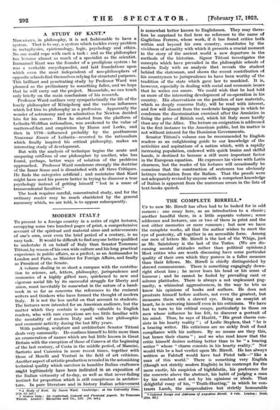MODERN ITALY.t
To present to a foreign country in a series of eight lectures, occupying some two hundred pages of print, a comprehensive account of the spiritual and material aims and achievements of one's own, over even the brief period of a century, is no easy task. It would be difficult to find anyone better qualified to undertake it on behalf of Italy than Senator Tommaso Tittoni, by reason of his own wide culture and his long practical experience in public affairs, as a prefect, as an Ambassador in London and Paris, as Minister for Foreign Affairs, and finally as President of the Senate.
A volume dealing in so short a compass with the contribu- tion to science, art, letters, philosophy, jurisprudence and economics of a highly gifted race, quickened to new and vigorous social life by its successful struggle for liberty and anion, must inevitably be somewhat in the nature of a hand- book in so far as concerns the references to the eminent writers and thinkers who have formed the thought of modern Italy. It is not the less useful on that account to students. The lectures were intended for an American audience, but the matter which they contain is equally valuable to English readers, who with rare exceptions are too little familiar with the mentality of modern Italy and with her philosophic and economic activity during the last fifty years.
With painting, sculpture and architecture Senator Tittoni deals very summarily. Ile confines himself to little more than an enumeration of names which are but little known in Great Britain with the exception of those of Canova at the beginning of the last century, of Costa in the middle period, of Mancini, Sartorio and Canonica in more recent times, together with those of Morelli and Venturi in the field of art criticism. Another aspect of artistic production revealed in the astonishing technical quality which survives in humbler Italian craftsmen Might legitimately have been indicated in an exposition of the Italian virtuosity of to-day, as well as that never-failing instinct for proportion which is still conspicuous in architec- ture. In pure literature and in history Italian achievement
• A Study of Hart. By Jewett Ward. Cambridge : at the lJnIvereity Prem (12e. ed. net.)
Modern Italy: Meenall Its Intellectual, Cultural A and Pnteasteiat wed*. By Tommaeo. London : tan and Co., Ltd. [lis. net.] is somewhat better known to Englishmen. They may there- fore be surprised to find here no reference to the name of Guglielmo Ferrero, whose work, if it has found critics both within and beyond his own . country, constitutes by the vividness of actuality with which it presents a crucial moment in the story of the ancient world a new departure in the methods of the historian. Signor Tittoni investigates the concepts which have prevailed in the philosophic schools of modern Italy with an analysis that reveals the student behind the statesman, and shows the recent contribution of his countrymen to jurisprudence to have been worthy of the tradition of the state which gave law to mankind. It is, however, especially in dealing with social and economic issues that he writes con amore. We could wish that he had told us more of the interesting development of co-operation in his country. His observations on the problem of raw materials, which so deeply concerns Italy, will be read with interest, and few will dissent from the moderate language in which he condemns the discrimination exercised after the Armistice in fixing the price of British coal, which hit Italy more hardly than any of the Allies. The lecture on emigration is addressed in the first instance to the American public, but its matter is not without interest for the Dominion Governments.
Senator Tittoni's volume can be recommended to English readers as an enlightening guide to our knowledge of the activities and aspirations of a nation which, with a rapidly increasing population, endowed with quick brains and skilful hands, is destined to become a still more important factor in the European equation. He expresses his views with Latin clearness, but the reader of his lectures will occasionally be conscious that the construction of sentences too obviously betrays translation from the Italian. That the proofs were not adequately revised by anyone with a competent knowledge of Italian is apparent from the numerous errors in the lists of text-books quoted.










































 Previous page
Previous page